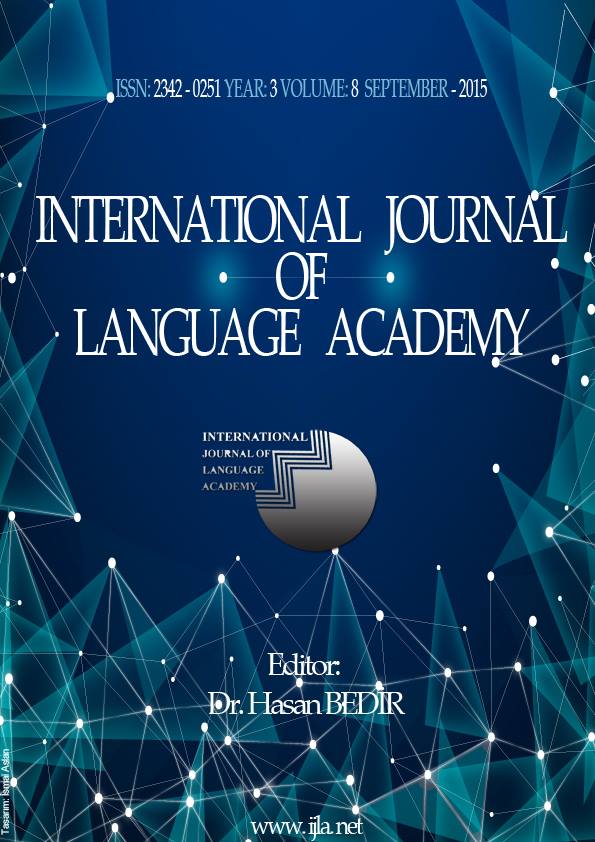Author :
Abstract
Bu makalenin amacı Kazuo Ishiguro’nun When We Were Orphans (2000) adlı romanında hafıza ve nostalji kavramlarını incelemektir. Eserde, anlatıcı ve başkahraman Christopher Banks çocukluğunda ortadan kaybolan anne babasını aramaktadır. Eser 1900’lerden 1958’e dek Christopher Banks’in hayatını anlatır bu yüzden iç konuşmaları vasitasıyla başkahramanın yetim hayatı bölünmüş parçalarla monolog olarak verilir. Hafıza bilinçli olup geçmişe dayandığından okuyucuyu kahramanın kimliğine yönlendirir. The Remains of the Day, When We Were Orphans (2000) ve Never Let Me Go adlı eserlerinde, Ishiguro kimlik, yuva ve benlik arayışında olan karakterlerin geçmişlerini ve belleklerini aktarır. Buna ek olarak da Şanghay Yerleşkesinin ve Sino-Japon savaşının tarihi ve politik kökenlerinin önemi olduğundan bu makalede okuyucuya tarih, gerçek ve kurgu arasındaki ilişkiyi anlamlandırabilmeleri için bunlar aktarılacaktır. Roman nostaljinin mutsuzluğa sevk edebileceğini ve tehlikeli olabileceğine göstermesine rağmen, “Ishiguro şimdikinden daha iyi bir Dünya hayali sağlayabileceğinden, bir dayanak da olabileceğini gösteriyor” (Weston, 2012: 337). Bir tür boşluğun bellek vasıtasıyla doldurulduğundan, Christopher’ın bellek ve nostaljik yönüyle yaşamaya devam ettiği sonucuna varılacaktır.
Keywords
Abstract
The aim of this paper is to analyse the notions of memory and nostalgia in Kazuo Ishiguro’s novel When We Were Orphans (2000), in which the protagonist-narrator Christopher Banks searches for his parents, who disappeared suddenly in his childhood. The novel tells the life of Christopher banks from 1900s to 1958, therefore the fragmented sources of his orphanage lead to a formation of monologue through his inner speeches. The memories guide the reader to know about his identity now that memory is related to past and it is a deliberate and conscious action of human beings. In The Remains of the Day (1989), When We were Orphans (2000) and Never Let me Go (2005), Ishiguro writes about memory and past of the characters in search of an identity, home and self. Additionally, since historical and political background of the Shanghai Settlement and the Sino-Japanese War plays a crucial role, it will be explained to enable the reader perceive the relationship between history, fact and fiction. Although the novel portrays that nostalgia may cause unhappiness and “… that nostalgia can be dangerous, Ishiguro also demonstrates that it can serve as a foundation for imagining a World better than one’s present” (Weston, 2012: 337). It will be concluded that Christopher seems to go on living through his memories and his nostalgic part since the sort of emptiness is filled with his memories.
Keywords
- Bhabha, Homi K. (1994). The location of culture. London: Routledge.
- Bizzini, Silvia Caporale. “Recollecting memories, reconstructing identities: Narrators as storytellers in Kazuo Ishiguro’s When we were orphans and Never Let Me Go.” Atlantis: Journal of the Spanish Association of Anglo-American Studies 35.2 (2013): 65-80. Researchgate. Web. 21 May 2015.
- Cook, Pam (2005). Screening the past: Memory and nostalgia in cinema. London: Routledge.
- Holmes, Frederick M. “Realism, dreams and the unconscious in the Novels of Kazuo Ishiguro.”Acheson, James, and Ross, Sarah, eds. Contemporary British Novel. Edinburgh: Edinburgh University Press, 2005. ProQuest & Ebrary. Web. 23 May 2015. 11-23.
- Ishiguro, Kazuo (2000). When we were orphans. New York: Vintage.
- “Ishiguro, Kazuo.” British Council. Web. 10 April 2015.
- “Nostalgia.” Wikipedia. Web. 24 May 2015.
- Hackett, Bob and Sander Kingsepp. “The seizure of shanghai’s international settlement 1941.” Imperial Japanese Navy Page. Web. 25 May 2015.
- Loomba, Ania (1998). Colonialism/Postcolonialism. London: Routledge.
- Young, Robert J. C. (2001). Postcolonialism: An historical introduction. Oxford: Blackwell Publishing.
- Walder, Dennis. (2011). Postcolonial Nostalgias: Writing, representation and memory. London: Routledge.
- Weston, Elizabeth. “Commitment rooted in loss: Kazuo Ishiguro’s when we were orphans.” Critique: Studies in Contemporary Fiction 53.4 (2012): 337-354. London: Routledge. Tandfonline. Web. 26 May 2015.





